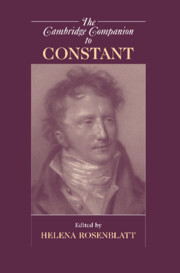Book contents
- Frontmatter
- Introduction
- 1 Benjamin Constant: Life and Work
- Part I The Political Thinker and Actor
- 2 Liberalism’s Lucid Illusion
- 3 The Liberty to Denounce: Ancient and Modern
- 4 Constant’s Idea of Modern Liberty
- 5 Benjamin Constant and the Terror
- 6 Constant’s Thought on Slavery and Empire
- 7 Benjamin Constant as a Second Restoration Politician
- Part II The Psychologist and Critic
- Part III The Analyst and Historian of Religion
- Conclusion
- 15 Eclipses and Revivals Constant’s: Reception in France and America 1830-2007
- Bibliography
- Index
- Series List
3 - The Liberty to Denounce: Ancient and Modern
from Part I - The Political Thinker and Actor
Published online by Cambridge University Press: 28 July 2009
- Frontmatter
- Introduction
- 1 Benjamin Constant: Life and Work
- Part I The Political Thinker and Actor
- 2 Liberalism’s Lucid Illusion
- 3 The Liberty to Denounce: Ancient and Modern
- 4 Constant’s Idea of Modern Liberty
- 5 Benjamin Constant and the Terror
- 6 Constant’s Thought on Slavery and Empire
- 7 Benjamin Constant as a Second Restoration Politician
- Part II The Psychologist and Critic
- Part III The Analyst and Historian of Religion
- Conclusion
- 15 Eclipses and Revivals Constant’s: Reception in France and America 1830-2007
- Bibliography
- Index
- Series List
Summary
What is wrong, legally and morally, with a two-track judicial system, where most suspects are tried in ordinary courts but where individuals who are alleged to be especially dangerous are hauled before extraordinary civilian tribunals or “military commissions” with radically reduced procedural guarantees? Benjamin Constant asked and answered this question, with exemplary clarity, two hundred years ago: “It means declaring men convicted ahead of time, even when they are only accused.” No infallible external signs distinguish the guilty from the innocent. This is why legal procedures must not be casually circumvented, for they remain “the best methods available for ascertaining the facts.” That political authorities that claim to be curtailing due-process rights for the sake of “public safety” are guilty of “absurdity,” if not outright mendacity, was another one of his lifelong convictions. Even more remarkably, he explained in persuasive detail how the system of criminal justice is inevitably perverted when it is assigned the task not of punishing past crimes but of preventing future ones. “The pretext of preventing future crimes,” he argues, is wholly incompatible with a free society for the simple reason that “the possibility of committing a criminal act is an inherent feature of individual liberty.”
- Type
- Chapter
- Information
- The Cambridge Companion to Constant , pp. 47 - 68Publisher: Cambridge University PressPrint publication year: 2009
- 3
- Cited by

